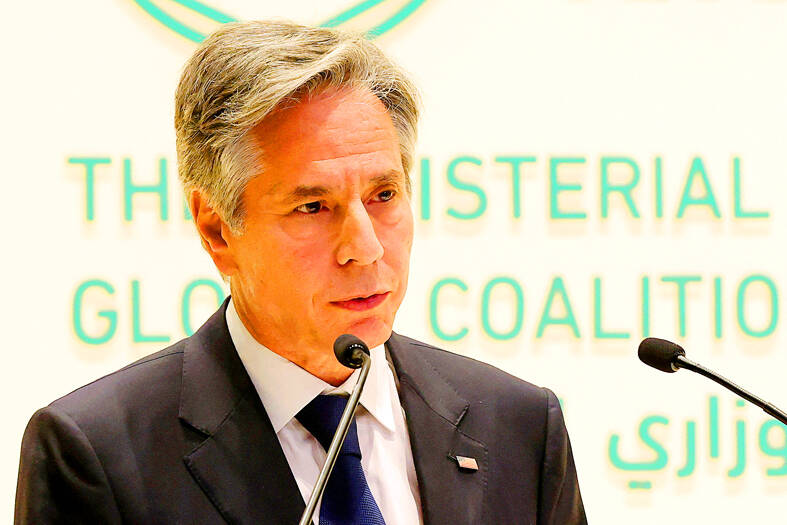The US and five of its allies on Friday condemned the use of trade practices that amount to economic coercion in a joint declaration that did not single out other countries, but appeared to be aimed at China.
Australia, Canada, Japan, New Zealand and the UK jointly released the statement with the US, saying that “trade-related economic coercion and non-market-oriented policies and practices” threatened the multilateral trading system and “harms relations between countries.”
The statement comes after G7 leaders last month agreed to an initiative to counter economic coercion and pledged action to ensure that any actors attempting to weaponize economic dependence would fail and face consequences.

Photo: Reuters
Canada, Japan, the UK and the US are also members of the G7.
The countries expressed concern about “pervasive subsidization,” anti-competitive practices by state-owned enterprises, forced technology transfer and government interference with corporate decisionmaking.
Washington has regularly raised such concerns about trade practices by Beijing, and an official from the Office of the US Trade Representative, who spoke to reporters about the joint declaration, cited China for imposing a ban on imports from Lithuania after it allowed Taiwan to open a de facto embassy.
China suspended imports of beef, dairy and beer from Lithuania last year.
Beijing last month protested the G7’s declarations, including on economic coercion, saying that the US was “pushing hard to weave an anti-China net in the Western world.”
In their joint statement, the US and its five allies raised concerns about forced labor.
“We are also seriously concerned about the use of forced labor, including state-sponsored forced labor, in global supply chains,” they said.
“All forms of forced labor are gross abuses of human rights, as well as economic issues, and it is a moral imperative to end these practices,” they added.
Separately, US Secretary of State Antony Blinken would travel to China next week, rescheduling a visit that was canceled in February after a saga over a suspected surveillance balloon, US officials said on Friday.
Blinken is expected to arrive in Beijing on Sunday next week, the first trip by a top US diplomat to China since then-US secretary of state Mike Pompeo in October 2018, US officials said on condition of anonymity.
The US Department of State has not officially announced his travel.
US National Security Council spokesman John Kirby recently said that the US would announce travel by senior officials “in the near future,” without giving details.
US President Joe Biden and Chinese President Xi Jinping (習近平) met in Bali in November last year and agreed to prevent tensions from soaring out of control, including by sending Blinken to Beijing.
Blinken abruptly canceled a trip scheduled in early February after the US said that it detected — and later shot down — a Chinese surveillance balloon flying over the US mainland, drawing fury from US lawmakers and denials by Beijing.

The US government has signed defense cooperation agreements with Japan and the Philippines to boost the deterrence capabilities of countries in the first island chain, a report by the National Security Bureau (NSB) showed. The main countries on the first island chain include the two nations and Taiwan. The bureau is to present the report at a meeting of the legislature’s Foreign Affairs and National Defense Committee tomorrow. The US military has deployed Typhon missile systems to Japan’s Yamaguchi Prefecture and Zambales province in the Philippines during their joint military exercises. It has also installed NMESIS anti-ship systems in Japan’s Okinawa

‘WIN-WIN’: The Philippines, and central and eastern European countries are important potential drone cooperation partners, Minister of Foreign Affairs Lin Chia-lung said Minister of Foreign Affairs Lin Chia-lung (林佳龍) in an interview published yesterday confirmed that there are joint ventures between Taiwan and Poland in the drone industry. Lin made the remark in an exclusive interview with the Chinese-language Liberty Times (the Taipei Times’ sister paper). The government-backed Taiwan Excellence Drone International Business Opportunities Alliance and the Polish Chamber of Unmanned Systems on Wednesday last week signed a memorandum of understanding in Poland to develop a “non-China” supply chain for drones and work together on key technologies. Asked if Taiwan prioritized Poland among central and eastern European countries in drone collaboration, Lin

TRAGEDY STRIKES TAIPEI: The suspect died after falling off a building after he threw smoke grenades into Taipei Main Station and went on a killing spree in Zhongshan A 27-year-old suspect allegedly threw smoke grenades in Taipei Main Station and then proceeded to Zhongshan MRT Station in a random killing spree that resulted in the death of the suspect and two other civilians, and seven injured, including one in critical condition, as of press time last night. The suspect, identified as a man surnamed Chang Wen (張文), allegedly began the attack at Taipei Main Station, the Taipei Fire Department said, adding that it received a report at 5:24pm that smoke grenades had been thrown in the station. One man in his 50s was rushed to hospital after a cardiac arrest

ON ALERT: Taiwan’s partners would issue warnings if China attempted to use Interpol to target Taiwanese, and the global body has mechanisms to prevent it, an official said China has stationed two to four people specializing in Taiwan affairs at its embassies in several democratic countries to monitor and harass Taiwanese, actions that the host nations would not tolerate, National Security Bureau (NSB) Director-General Tsai Ming-yen (蔡明彥) said yesterday. Tsai made the comments at a meeting of the legislature’s Foreign Affairs and National Defense Committee, which asked him and Minister of National Defense Wellington Koo (顧立雄) to report on potential conflicts in the Taiwan Strait and military preparedness. Democratic Progressive Party (DPP) Legislator Michelle Lin (林楚茵) expressed concern that Beijing has posted personnel from China’s Taiwan Affairs Office to its